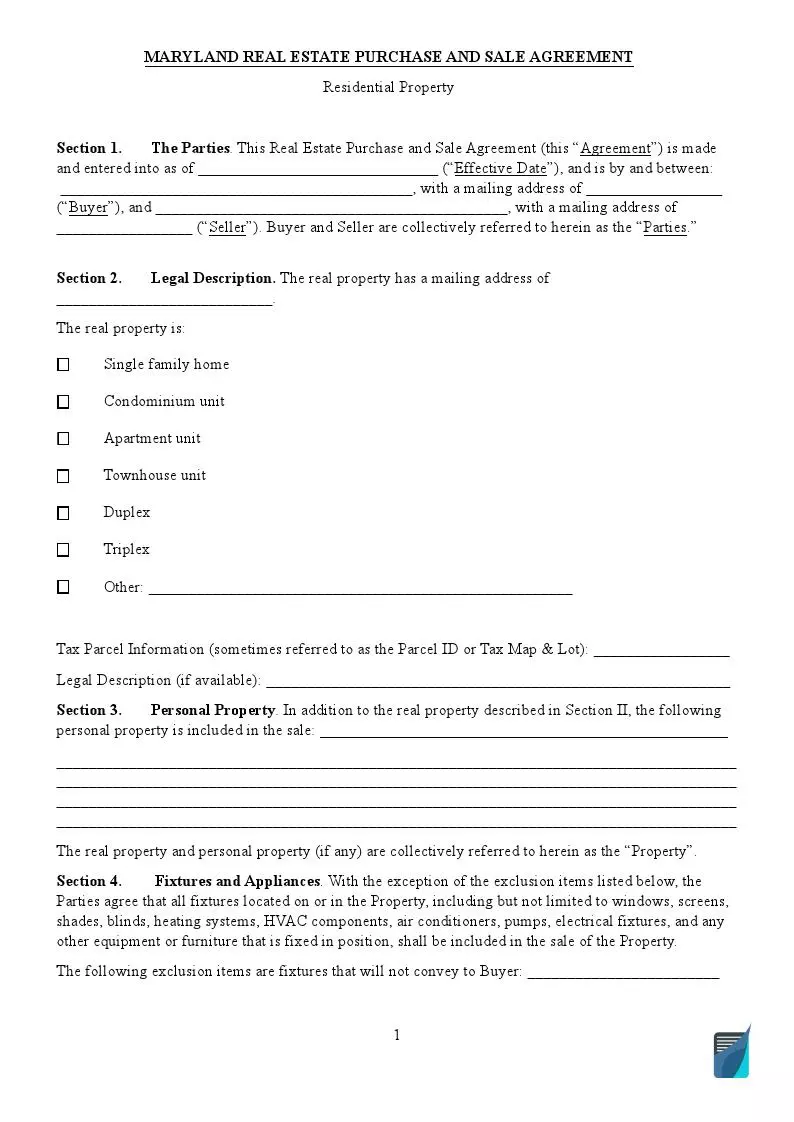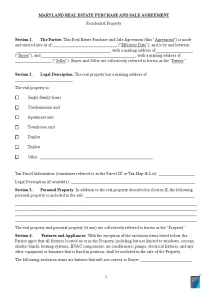Maryland Real Estate Purchase Contract
Maryland Real Estate Purchase Agreement serves to prove that two parties, the seller and the buyer, have come to the final step before transferring the ownership of the premises. Regardless of the type of property, the fillable purchase and sale agreement will contain both the seller’s and purchaser’s personal information, a detailed description of the building (or land), the price, the payment conditions, and other important details.
The process of selling your property is quite complicated, so we recommend seeking legal assistance while creating the contract. Normally, both parties will also hire a licensed agent to represent them during the agreement procedure.

Build Your Document
Answer a few simple questions to make your document in minutes
Save and Print
Save progress and finish on any device, download and print anytime
Sign and Use
Your valid, lawyer-approved document is ready
Maryland Residential Purchase and Sale Agreement
When you intend to sell your residential property, you need to fill out the nine pages of the Residential Purchase and Sale Agreement. This paper will contain both parties’ personal data, including residential and mailing addresses, legal descriptions of the premises, the purchase price and terms, closing details, and other details.
You have three options when it comes to providing monetary funds for this property. The buyer may choose to transfer all the sum in cash, take a loan in a bank, or agree upon seller financing. All additional conditions concerning each particular case are described in the contract.
The deposit, or earnest money, has to be provided to the seller to guarantee that the deal will be closed. Still, it does not mean that the agreement cannot be terminated. The conditions for returning the earnest money are negotiated and indicated in the paper.
The seller will save their right to operate the property until the specific date mentioned in the paper. The buyer can obtain a survey of the property to inspect whether there are any defects or malfunctions, which the seller must remedy until the closing date.
Once all sellers, buyers, and agents sign the paper, the parties must do their best to perform their responsibilities. All of them affirm to have provided true and correct information about themselves. While the seller is responsible for the info about the premises’ condition, the buyer is held accountable for their solvency.
Maryland Commercial Purchase and Sale Agreement
The Commercial Agreement is a more complicated version of the Maryland Real Estate Purchase Agreement. It consists of more details, warranties, disclosures and implies that both parties have legal consultants to prevent any unwanted misunderstanding. It is very often that one or both parties are not individuals but entities.
This document is designed for the sale and purchase of the following types of property:
- Industrial Property
- Land (only)
- Multi-Family
- Office Building
- Retail Property
- Mixed-Use Property
- Or Other.
If the buyer opts for bank financing, they will also have to agree with the conditions concerning the issues below (described in the paper in detail):
- Loan Application
- Contingency
- Letter
- Failure to Produce
- Seller’s Approval
- Fees
If the buyer and the seller have agreed upon seller financing, they should indicate the loan amount, down payment, interest rate, term, and specific documentation.
The potential property owner will have to provide a deposit, or earnest money, to show their intention to purchase the building. If the buyer fails to comply with any of the conditions they have agreed upon after signing the agreement, the earnest money will not be returned. However, if any extra defects or severe damage are discovered before closing, the buyer may terminate the deal and get the deposit back without any liabilities.
The buyer will also have a specified period to closely inspect the premises (you may choose to hire a professional contractor) to ensure that the property is in satisfactory condition.
The parties agree that the seller will continue to operate the property until closing. They affirm to maintain the property in its current condition.
The seller is obliged to attach the following disclosures during the inspection period:
- Title Commitment
- Disclosure Statement
- Other Related Agreements
- Studies and Reports
- Written Notices
- Water Rights
- Copies of Leases
- Other documents that may serve as evidence to adversely affect its value
If any dispute between the parties occurs, they agree to seek professional mediation (splitting the cost of it). If this does not help, the dispute should be solved by a neutral arbitrator following Maryland law.
If any of the provisions in the contract are found ineffective or unenforceable, only those particular provisions have to be corrected or modified, while all the other terms remain valid.
In case any licensed agents are involved in the procedure, they are entitled to payment for their services as outlined in a separate written agreement.
All notices should be in writing and can be delivered through the mail, email, or in person.
The paper must be witnessed, rechecked, and then signed by all parties. The seller(s), the buyer(s), and their agents have to append their signatures, print names, and date the paper.
Required Seller Disclosures in Maryland
There are several additional documents the seller must provide before closing. Selling and buying property is a huge responsibility. If it is a case of residential property, the homeowner is obliged to provide the Lead-Based Paint Disclosure if their house was built before 1978. According to 42 U.S. Code § 4852d, this is mandatory because of the potential harm that this paint may cause to the new dwellers when it chips. You will also have to, in accordance with § 10-702, complete the Residential Property Disclosure and Disclaimer Form, where you will have to describe the condition of your premises in detail. This paper includes info about:
- Water Supply
- Sewage Disposal
- Garbage Disposal
- Dishwasher
- Heating System
- Air Conditioning
If there are any zoning violations, nonconforming uses, violation of building restrictions, or any recorded or unrecorded easement you are aware of, you must inform the buyer about it.
